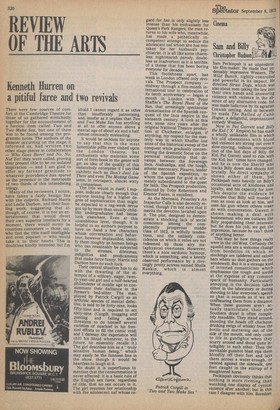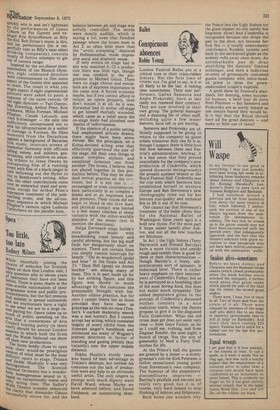Cinema
Sam and Billy
Christopher Hudson Sam Peckinpah is an unpredictable film-maker. He made that un deniably impressive Western, The Wild Bunch, tightly-controlled and powerful in its impact. He directed Straw Dogs, which was
also about men taking the law into their own hands and answering
violence with violence in the ab
sence of any alternative code, but was made ludicrous by its agrarian
Cornish setting. And in between he made The Ballad of Cable Hogue, a delightful, unpretentious comedy Western. Now in Pat Garrett and Billy the Kid (' X ' Empire) he has made a wholly unlikeable film in which his old obsessions with blood and violence are strung out over a slow-moving, tedious reconstruction of the last days of Billy the Kid. Pat Garrett used to ride with the Kid, but 'times have changed and he is now the Sheriff who tracks Billy down and shoots hirn brutally. No direct sympathy 15 shown either of them, but Peckinpah rests heavily on Billy's occasional acts of kindness and loyalty, and his capacity for love. This despite the evidence he provides that Billy will murder a man as soon as look at him, and uses his gun where others make do with conversation. Garrett Is shown making a deal with businessmen who see outlaws like Billy jeopardising their interests: but he does his job, we get the impression, because he can't think of anything better. This may be how things really were in the old West. Certainly the squalid sets are a welcome change from bordellos in which no stockings are laddered and saloon bars where no dust gathers on the windowsill. But it is a strange kind of inverted romanticism which emphasises the tough and sordid at the expense of any common spark of humanity. Particularly annoying is the decision taken either in the laboratory or during shooting to blur everyone's speech so that it sounds as if we are oveThearing them from a distance. When these gunmen aren't actually inarticulate, their sloW Southern drawl is often completely inaudible. They stand around, shooting the heads off chickens, drinking swigs of whisky from the bottle and muttering out of the side of the mouth, and only come to life in gunfights when they scurry around and shout quite intelligibly to each other. Then the inevitable gunshot blast rips them bloodily off their feet and lays them across a water-trough, or twisted against the sidewalk, one foot caught in the stirrup of a slaughtered horse.
Peckinpah obviously thinks that nothing is more riveting than watching one display of cynical violence after another; but in this case I disagree with him. Boredom
Spectator September 8, 1973
quickly sets in and isn't lightened by the performances of James Coburn as Pat Garrett and exsinger Kris Kristofferson as Billy the Kid. Bob Dylan's music is dire, and his performance (he is respectfully cast as Billy's near-silent drinking companion) consists mostly of furtive attempts to get out of camera range.
Inspired by the soi-disant internationalism of the Munich OlymPies, eight celebrated directors were commissioned to, film some aspect of the Games that appealed to. them. The result is what you might expect if eight impressionist painters were asked to paint a segment of the same canvas. Of the eight directors — Yuri Ozerov, Mai Zetterling, Arthur Penn, Kon Ichikawa, Milos Forman, Michael Pfleghar, Claude LeLouch and John Schlesinger — the only one sufficiently unimpressed not to . sink his idiosyncrasies in a welter of homage is Forman. He films moments from the Decathlon against a background of Bavarian folk music, intercuts scenes of bierkeller Germany with officials falling asleep and athletes gesticulating, and contrives an amusing tribute to Jesse Owens by Juxtaposing film of a running event with film of a black singer in tails bellowing out the Hymn to JoY in Beethoven's setting. After Ibis, the other contributions come over as somewhat staid and pomPolls, except for Arthur Penn's expressive treatment of the polevaulting event, and the all-tooshb,ort sequence in which Michael rneghar's camera ogles Ludmila Turistcheva on the parallel bars.



































 Previous page
Previous page